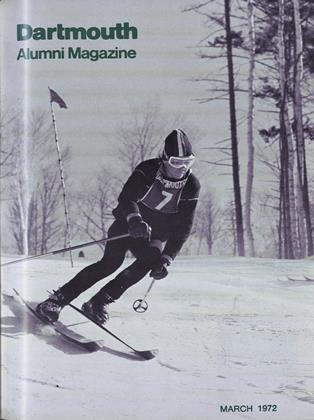The year 1972, launched amid hopes of a new era of improved communication between China and the western world, is timely for the publication of Lin Yutang's Chinese-English Dictionary of Modern Usage, a monumental work first conceived by the eminent linguist two decades ago.
Director of the Dictionary Project of the Chinese University of Hong Kong, whose imprint it will bear, is FRANCIS KUANG-CHIUNG PAN '26. For more than a year, released from his duties as Director of Publications and of the Students' Appointment Service at the university, Pan has been in sole charge of final compilation, copy-editing, and proof-reading the 1400-page volume.
The new dictionary, first major effort in 40 years to codify and define components of the Chinese language, includes all words and phrases the reader might find in popular publications, but it also draws on the scholar's classical Chinese for vocabulary.
Drastically different in approach from its predecessors, it treats Chinese as a living language of words, more often than not poly-syllabic, rather than characters, which have widely varying meanings and functions as they combine with other characters. The approach tends to confirm the contention that Chinese has a basic grammatical structure akin to that of Indo-European languages.
The new lexicon lists some 8000 characters and 100,000 words, with a unified pronunciation based on the standard Peiping dialect and a Romanized spelling which can be typewritten, telegraphed, or computerized. The words are identified by part of speech, dialect of origin, and connotative nuance.
A multiple index system enhances its usefulness to the scholar or the foreigner seeking to dissolve some of the inscrutability of the language. There is a Romanized Index for those who know the sound but not the Chinese character. A complex Numerical Index groups characters by their left tops (initials) and right bottoms (finals), rather than by stroke count of the 214 basic "radicals" or by the even more complex classification according to the four corners of a character. A 200-page English Index, contributed by Pan and his staff, is virtually an English-Chinese dictionary in itself.
Since February 1971, when Lin Yutang delivered the 175-pound manuscript to project headquarters on the 12th floor of a Hong Kong office building, Pan and eight young bilingual assistants have been engrossed in preparing the dictionary for the printer. Pan himself has undertaken a meticulous scrutiny of the text and a collateral search to compare Lin's entries with those in other dictionaries, glossaries, and encyclopedias. Throughout, the "spot query" has gone on. Armed with notebooks on and off the job, the staff has systematically jotted down words and phrases heard on the streets, on radio or television or read in current periodicals, in order to expand the comprehensiveness of the dictionary. The "catch" of each day's "fishing cruise," collected and submitted to the author, has added several thousand words to the manuscript.
The team has worked under a rigid security system worthy of a spy thriller. Owing to a rather cavalier attitude in the area toward the niceties of copyright, staff members were required to sign a 12-point Security Code, including a vow "not to indulge in gossip." The manuscript room is open only to authorized personnel, data sheets are kept under lock and key, and the volume is being printed in Tokyo, delivered there by the Director in person.
Francis Pan brings to his position rich and varied experience. He followed his brother Quentin '24 to Dartmouth, where he took a master's degree from the Tuck School as well as the A.B. Leaving Hanover, he earned a doctorate from NYU and worked with the China Institute in America and the Institute of International Trade in New York before returning to China in 1930. Five years in publishing were followed by high government posts and service with international missions and private companies. He has taught business and management at several universities, set up a Graduate School of Business at Hong Kong University, and operated successful investment and trade firms. He has been a refugee in Hong Kong since 1949.
Quentin Pan remained in Peiping. That he has not heard from his brother in six years "has been a constant source of anxiety," Francis reports. A former professor and dean, Quentin was last known to be heading a research project at the National Institute of Racial Research.
Mrs. Francis Pan is a graduate of Oberlin, who later received a master's degree in music education after study at the Julliard School and Teachers College at Columbia. A daughter Shirley, A.B. Wellesley, M.D. Columbia, is a practicing pediatrician in California.
A loyal alumnus, founding president of the Dartmouth Club of Hong Kong, and an alumni representative since 1949, Pan writes "Dartmouth is always very close to my heart. My last visit to Hanover was in 1967, and I would agree that it's about time for me to visit my Alma Mater again."
 View Full Issue
View Full Issue
More From This Issue
-
 Feature
FeatureFinancing Higher Education
March 1972 By John G. Kemeny -
 Feature
Feature"Fraternities Are in Trouble"
March 1972 By DAVID WRIGHT '72 -
 Feature
FeaturePilobolus: Energetic Dance-Theater
March 1972 By ANDREW W. CASSEL '72 -
 Feature
FeatureDartmouth Institute Plans First Session
March 1972 By M.R. -
 Article
ArticleFaculty
March 1972 By ROBERT B. GRAHAM '40 -
 Class Notes
Class Notes1950
March 1972 By JACQUES HARLOW, ERIC T. MILLER







